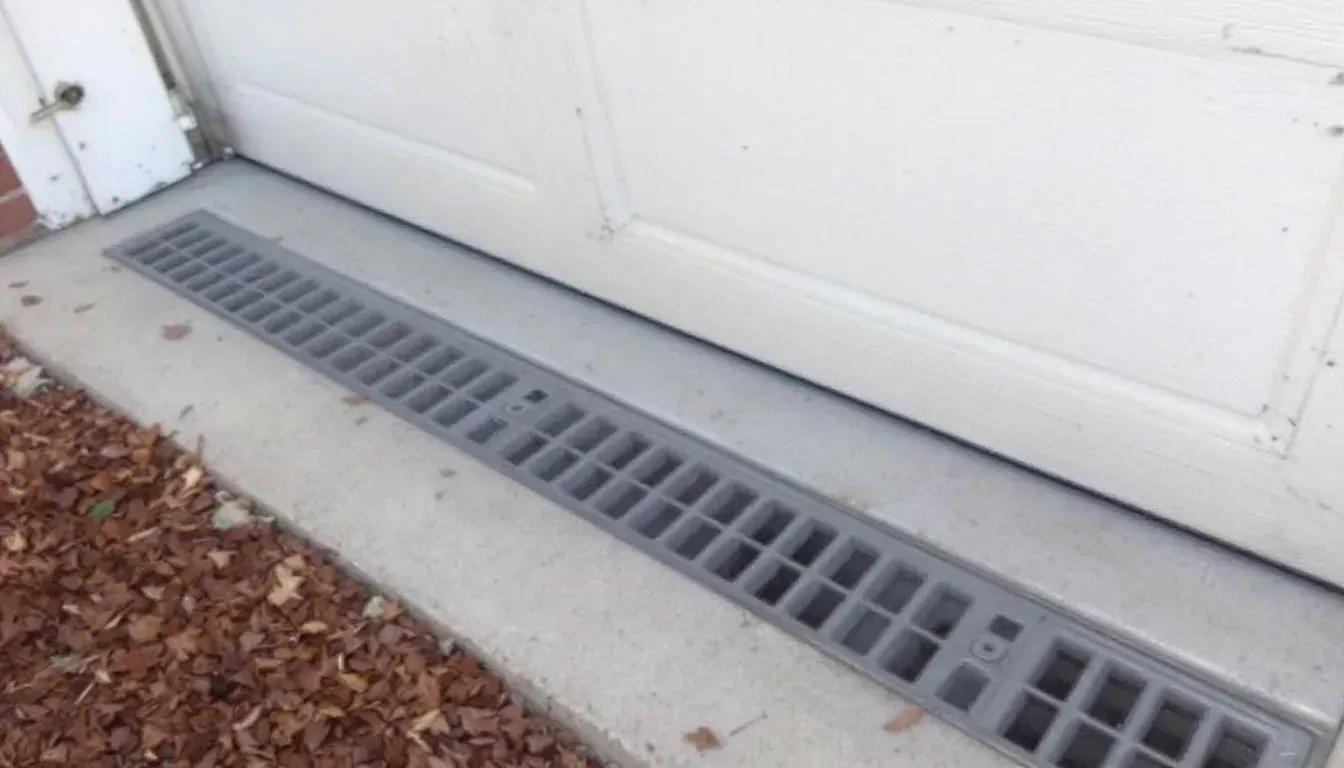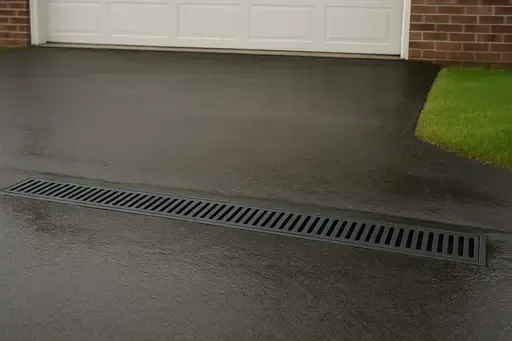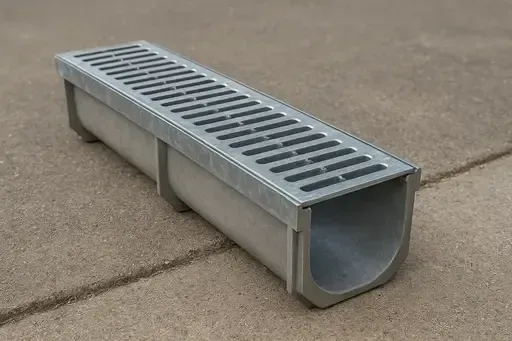Our Trench Drain Installation Process
We follow a proven process for every trench drain installation in Wichita. Our goal is to create a system that works perfectly the first time and keeps working for decades. Here's exactly what happens when you work with us.
Site Evaluation and Measurement
Before we dig anything, we come to your property to figure out the best plan. We walk around and look at how water flows across your driveway, patio, or wherever you're having problems. We check the slope of your property, even slight grades matter when you're moving water.
We measure where the water is coming from and where it needs to go. On flat Wichita properties, we sometimes need to create slope where there isn't much natural grade. We also look at your existing drainage to see how a new trench drain will connect with your gutter downspouts and underground drain lines.
During this visit, we locate any underground utilities like gas, electric, or water lines. We also check Sedgwick County requirements to see if your project needs a permit. If it does, we handle all that paperwork for you.
By the end of our evaluation, we know exactly where your trench drain needs to go, how deep it needs to be, and where the water will discharge.
[For more info on Wichita permits and regulations, see our
Wichita Gutter Code and Permits Guide]
Excavation and Channel Placement
Once you approve the plan, we start digging. We carefully excavate a trench following the exact path we mapped out. The depth and width depend on the size of channel you need, a driveway trench drain is different from a small patio drain.
Getting the slope right is critical. Water won't flow uphill, so we make sure the entire channel slopes toward the outlet. Even on really flat properties, we can create the grade needed to keep water moving.
We place the trench drain channel in the excavated area and connect it to the outlet pipe. This pipe takes water to your discharge point, maybe the street, a storm drain connection, or another part of your underground drainage system. We integrate trench drains with your existing gutter downspout system when that makes sense, creating one complete water management solution.
The channel gets set in a bed of concrete or gravel (depending on the application) to keep it stable and prevent settling. Everything gets leveled and checked multiple times before we move forward.
Grate Installation and Testing
After the channel is secure, we install the grate on top. We choose grates based on what will be driving or walking over them. A residential driveway gets a different load rating than a commercial parking lot.
The grate sits flush with the surrounding surface, whether that's concrete, asphalt, or pavers. This creates a smooth transition so you don't feel a bump when you drive over it.
Before we call the job done, we test everything. We run water through the system to make sure it flows correctly and drains completely. We check that there are no low spots where water could sit. We verify the outlet is working and water is going where it should.
If we find any issues during testing, we fix them right then. You only pay for a trench drain system that works perfectly.
Our installation process typically takes one to two days for most residential properties, depending on how long the trench drain run is and whether we're
connecting to other drainage systems. We work efficiently and clean up completely when we're finished, leaving you with a property that finally handles water the right way.
Trench Drain Materials & Grate Options
Choosing the right materials for your trench drain matters. The channel and grate need to handle Wichita's weather, support the weight of whatever drives over them, and last for years without cracking or rusting. Here's what we recommend for different situations.
Channel Material Options
The channel is the main body of your trench drain, so it needs to be tough. We use three main types of materials depending on your property and budget:
Polymer Concrete
This is our most popular choice for residential trench drains. Polymer concrete channels are lighter than regular concrete but just as strong. They resist chemicals, won't absorb water, and handle freeze-thaw cycles without cracking. They're perfect for Wichita's weather extremes and cost less than metal options.
Fiberglass
For areas that need extra chemical resistance or lighter weight, fiberglass channels work great. They're common in commercial settings but also good for residential pool decks or areas where you want a rust-free option that lasts forever.
Stainless Steel
When you need the strongest, longest-lasting option, stainless steel channels are the answer. They're more expensive but literally indestructible. We use these for heavy commercial applications or when a property owner wants the absolute best.
For most Wichita homes, polymer concrete gives you the best mix of durability, performance, and value.
Grate Options for Every Application
The grate is what you see and walk or drive on, so it needs to be both functional and look good. We match the grate to how it will be used.
Residential Driveways
For home driveways, we typically install cast iron grates or heavy-duty plastic grates. Cast iron looks classic and handles vehicle weight easily. Modern plastic grates are surprisingly strong, cost less, and won't rust. Both options come in different patterns—from simple slots to decorative designs that complement your home's style.
Heavy-Duty Commercial
Commercial properties need grates that can take serious abuse. We use ductile iron or steel grates rated for heavy traffic, delivery trucks, and constant use. These grates are engineered for specific weight loads and built to last decades even under tough conditions.
ADA-Compliant Options
If your trench drain crosses a walkway, entrance, or any pedestrian area, it might need to be ADA compliant. This means the grate openings must be small enough that wheelchair wheels, canes, and crutches won't get caught. We have several compliant grate styles that meet these requirements while still allowing plenty of water through.
Understanding Load Ratings
Grates are rated by how much weight they can handle. Here's what the ratings mean in simple terms:
- Light Duty (Class A)
-
Pedestrian areas only, no vehicles
- Medium Duty (Class B) - Residential driveways and light vehicle traffic
- Heavy Duty (Class C-F) - Commercial lots, roadways, and heavy trucks
We always install grates rated higher than what you actually need. This gives you a safety margin and means your trench drain will hold up even if heavier vehicles occasionally use it.
Making It Look Good
Your trench drain should work perfectly but also look like it belongs on your property. We help Wichita homeowners choose grates that match their home's style:
- Traditional brick homes look great with classic cast iron slot grates
- Modern designs might use sleek stainless steel or black powder-coated grates
- Natural stone patios pair well with decorative patterns that complement the stonework
The goal is a trench drain that solves your water problem without looking like an industrial afterthought. We take the time to show you options and explain what will look best on your specific property.
Whether you need a simple driveway drain or a complete drainage system with multiple trench drains, we'll recommend materials and grates that fit your needs, budget, and style. Good materials installed correctly mean your trench drain will still be working perfectly twenty years from now.



